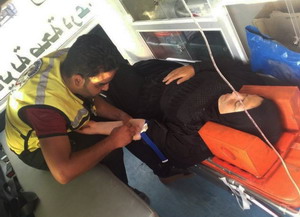
In Dar’a and Quneitra governorates, local health partners supported by WHO are providing health care and nutritional screening services through static medical points and mobile clinics. Health partners in Dar’a have provided over 19 000 consultations thus far. In neighbouring Quneitra governorate, mobile teams have provided more than 2500 consultations to internally displaced people in rudimentary camps. Over 15 000 children in Dar’a and Quneitra have been screened for malnutrition.
“With a large number of public health facilities in southern Syria damaged or destroyed, it is more important than ever that WHO and partners are able to step in and provide vital health care services to the Syrian people,” said Elizabeth Hoff, the WHO Representative in Syria. “WHO stands ready to support the provision of health care and the revitalization of public health care facilities by all means in its power.”
 WHO has also supported the establishment of referral services for seriously ill and wounded patients in southern Syria. To date, 363 patients have been referred to hospitals in Dar’a and Damascus for treatment.
WHO has also supported the establishment of referral services for seriously ill and wounded patients in southern Syria. To date, 363 patients have been referred to hospitals in Dar’a and Damascus for treatment.
Despite the scaled-up response to health needs in southern Syria, WHO’s humanitarian work in Syria remains severely underfunded. As of 12 August 2018, WHO had received less than one fifth of the US$ 141 million required in 2018.








 Amman, 15 August 2018 – The World Health Organization (WHO) is supporting the provision of life-saving health care services for more than 900 000 conflict-affected people in southern Syria.
Amman, 15 August 2018 – The World Health Organization (WHO) is supporting the provision of life-saving health care services for more than 900 000 conflict-affected people in southern Syria.